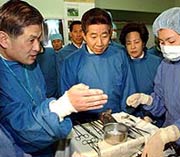 Cloning embryos to get patient-specific embryonic stem cells (stem cells genetically identical to the patient) has been a dismal failure. In the meantime researchers have put young women’s reproductive health and even their lives at risk to retrieve the hundreds of human eggs need for even one attempt at cloning a human embryo. Even Hwang lied about how many eggs it took in his attempts at cloning. He claimed he improved the process and needed less eggs. In reality, Hwang blew through many as 2,000 eggs from as many as 120 women in his failed attempt to become the first to clone a human embryo. Some of those eggs came from 2 junior researchers in Hwang’s own lab.
Cloning embryos to get patient-specific embryonic stem cells (stem cells genetically identical to the patient) has been a dismal failure. In the meantime researchers have put young women’s reproductive health and even their lives at risk to retrieve the hundreds of human eggs need for even one attempt at cloning a human embryo. Even Hwang lied about how many eggs it took in his attempts at cloning. He claimed he improved the process and needed less eggs. In reality, Hwang blew through many as 2,000 eggs from as many as 120 women in his failed attempt to become the first to clone a human embryo. Some of those eggs came from 2 junior researchers in Hwang’s own lab.
This commodification of women’s bodies by cloning researchers is totally unnecessary because scientists can create patient-specific embryonic-like stem cells without cloning and without eggs. These cells are called induced pluripotent stem cells (iPSCs) and some are calling them the new super model in biological research. Instead of cloning a human embryo and destroying him or her for the stem cells inside, scientists take a cell from the patient and reprogram it back to an embryonic-like state. No human organisms created and destroyed, no eggs needed and no specter of using the technology for reproductive cloning (cloning to produce children) in the future.
And yet Park Se-pill is still trying to clone human embryos. And he says he will do it before 2015. From The Korea Times:
Professor Park Se-pill at Jeju National University is striving to clone human embryonic stem cells by 2015, the much-touted breakthrough that no scientists have ever achieved.
The embryologist plans to start cloning human embryos and establishing stem cell batches from them beginning next year.
“Recently, the government approved Cheju National University as eligible to conduct human embryonic studies. We now need to get separate okays for specific research projects,” Park said.
“We will be able to start the work on human embryonic stem cells next year with the aim of finishing them by 2015. It will be tough as nobody has achieved it yet but we will do our best.”
What Park is trying to do is exactly the same as what Hwang Woo-suk, a former professor at Seoul National University, claimed to have done — though the purported feat later proved to be false.
Hwang stole the spotlight in the mid 2000s when two papers on the human embryonic stem cells were published as cover-story articles by the U.S. journal Science.
The exploits were expected to bring possible treatments for degenerative diseases such as diabetes but his work was found to be based on fabricated data and his team actually did not extract stem cells from the cloned human embryos.
“In fact, things are much difficult now compared to when Hwang carried out his research because we are now not allowed to use fresh eggs to duplicate embryos,” Park said.
“Instead, we have to depend on frozen eggs so that the success rate will be very low as amply demonstrated in animal experiments. We need to fix this problem.”
Hwang’s exploitation of women in his quest for cloning made South Korean outlaw the use of fresh eggs for these experiments so at least this time Se-pill cannot exploit young women just for his attempts.
But what if he successful? What then? Will the ban on using fresh eggs in his country stand? Will the frenzy that surrounded Hwang the first time mean an end to these protections for women against exploitation for cloning research?
And what will it mean for young women worldwide? Will a cloning boom mean an even more intense market for human eggs? Will it mean more poor women putting their fertility and lives at risk to satisfy the insatiable appetite of cloners?
I am certain it will. And for what? Stem cells we can get through other means. Thus proving what I have believed all along. Cloning for stem cells is not about stem cells nor treating patients. It is about creating human clones plain and simple. Just because we can. I love this quote from former President George W. Bush:
“Anything other than a total ban on human cloning would be virtually impossible to enforce. Cloned human embryos created for research would be widely available in laboratories and embryo farms. Once cloned embryos were available, implantation would take place. Even the tightest regulations and strict policing would not prevent or detect the birth of cloned babies.”
LifeNews.com Note: Rebecca Taylor is a clinical laboratory specialist in molecular biology, and a practicing pro-life Catholic who writes at the bioethics blog Mary Meets Dolly. She has been writing and speaking about Catholicism and biotechnology for five years and has been interviewed on EWTN radio on topics from stem cell research and cloning to voting pro-life. Taylor has a B.S. in Biochemistry from University of San Francisco with a national certification in clinical Molecular Biology MB (ASCP).







